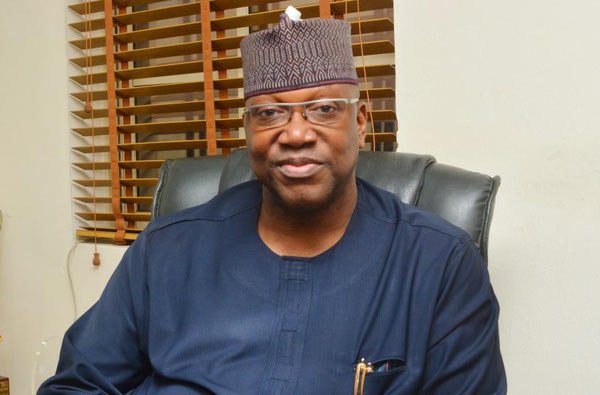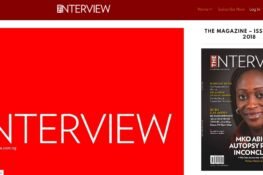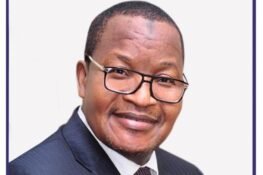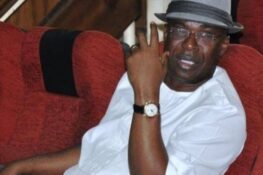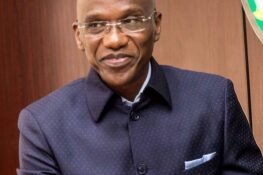John Momoh, the CEO of Channels, goes back over 20 years to share the story of the founding of Channels TV, the highs and the lows, the challenges, opportunities and why Channels remains a family business for now….
At what point during your years in NTA (Nigerian Television Authority) did you have the ‘crazy’ idea to set up your own TV station?
I thought there was need for us to do things differently. While I was at NTA there was an appetite for me to do things that would match international standards. I was reading the news like the anchor, Peter Jennings of ABC news and also looking to see if we could produce the news like ’60 Minutes’ in America. Those were the propelling and driving forces. I was able to change the way the news was written and after a while, I changed the whole news scripts. There was just that drive and a hunger to do something different.
With more private stations and the social media, how do you think you can remain competitive?
Every serious broadcaster or media should have a very vibrant social media department, which is what we’ve done. We are able to embrace all the social platforms and use them to our own benefit, so we are, tweeting our stories, we are getting people on Facebook, making sure people follow us, on Google we have the largest video archive in the country and a few months ago Google gave us an award for the number of people following us. It was important for us to use this technology to meet our own objectives and that’s the best thing that can happen to a traditional media house and it has worked.
Tell us, how did Channels start?
The full name is Channels Communication. We were looking for the best name for it and narrowed it down to Channels. Channels started after I left NTA and the parent company was Channels Incorporated Ltd. It was a post-production concern, basically to service international producers coming into the country to do documentaries and features. We were acting as the fixers; we were providing all the equipment. No sooner had I left NTA, the former military president, Babangida de-regulated the industry, and so I applied for a license. It was like a joke I mean here was an ex-anchor who had no money but was applying for a license. The application was put in on the closing day at the closing time of business but fortunately we were one of the few, one of the thirteen stations that were chosen at that time and we couldn’t start Channels because there were no funds. I travelled even to the US to see if we could get some funding. Many banks in Nigeria weren’t willing for this sort of thing; it was new territory.
Why go against NTA anyway?
Exactly! And where was the news going to come from? Is it the same government news that you’ve been reading all the years? But we’re dogged. Eventually we decided we have to keep our license. On the deadline itself, under the auspices of the British council we were able to get some small funding for a very tiny transmitter that was supposed to just radiate within these premises. We went on air focused on the output and changed the traditional way things were being done at NTA. We had new ways of doing things, new faces, and new dress code. We introduced graphics which were non-existent at NTA at that time, introduced music to make the news more palatable and that worked and between then and now the rest is history.
How important was this change to the audience?
I think it was very important to arrest the audience, to make TV more presentable to the audience. It’s about how attractive things look. Traditional attire is very attractive but it is flamboyant and it takes away from the seriousness of the news, so we needed something that would professional. We thought about a kaftan but eventually decided on suits. A suit is universal. The ladies wear their skirt suits and trouser suits and it works. We struck a chord with the viewers. Especially the young ones and that really made Channels the darling of the industry and the viewers.
The late President Musa Yar’Adua shut down your station during his tenure. What’s the real story?
What happened was there was a story that came through the NAN (News of Nigeria) wire, reporting that the late president may resign due to ill health. When we first saw the story coming through the NAN wire, we did not take it. We checked the online services and noticed other media such as the BBC and some other local stations had taken it, and so we decided to take the story. No sooner had we taken the story, we had a call notifying us that it was wrong and so we pulled it. This didn’t go down well with government, and so they came down heavily on us. I was out of the country when this happened, and so I flew back and immediately went to the state security while our guys were incarcerated. There was a lot of pressure from Nigerians, the international community, and from western governments.
I actually apologized to the former president in a letter, explaining the source of the story and that we meant no harm. He acknowledged my letter, wrote back saying he understood, and so we went back on air. This is one of the hazards of the profession and it also helped us ensure that we do the checks even much more than we were doing. We get a story and before we break it we cross check and double check and triple check. It was a learning curve for us; it has helped us, but we protested against NAN because they insinuated they were not our source by claiming their computers were hacked into. As a result of this scandal, we stopped subscribing to NAN and between then and now we have never used their service. It may not have been intentional, but it felt like sabotage.
During the 2015 general elections some media houses were fined for airing paid content, which was tagged ‘hate speech.’ How do you remain ethical and profitable?
We have a policy in the organization; professionalism is a watchword. Integrity is very important. You must be truthful, you must be independent at all times and you must check your facts and then underlining this as a backdrop is the fact that we must abide by the code of NBC and by the laws of the federation. So, when we were approached by the leading political parties to take these programmes that contained hate speeches, we told them we wouldn’t do that for any amount of money in the world. They offered us substantial amounts, which we turned down. If it offends the code, we won’t take it.
What other sort of pressure did you face during the elections and now?
There was pressure from both the opposition and the ruling parties who were competing for airtime. Due to the limited time available, sometimes we took them on a first come first serve basis. Regardless of how much was offered for a broadcast, we had to play a balancing game to ensure fairness.
Would you say poor ethics is a major problem in journalism in Nigeria?
I think it is one of the problems, apart from the fact that we need a lot of training for our journalists but ethics is a big problem. Daily, I try to reemphasize to my staff the fact that they must be ethical in all things. Entrepreneurs need to encourage attendance of workshops and seminars to continuously impress upon all staff the ethics of journalism. For example, ‘brown envelopes’ should not be tolerated. There is need for us to make sure that we do the right thing. Nigeria is a very peculiar country; at a party you are supposed to take gifts to the celebrant bur here, he ends up giving you gifts. We need to know where to draw the line, to identify what is acceptable and unacceptable. These are such lessons we teach and learn as an organization.
How do you ensure compliance?
We have a rulebook and we often remind ourselves of the rules. Errant staff are reprimanded or disciplined.
How do you cope with the infrastructural challenges in Nigeria, most notably the petrol crisis?
You know, we run a generator for the most part, so we are used to it. We have always done, ever since we started Channels. The national grid is our back-up power.
But this last time it was very scary. We were still running on our reserve of petrol and some people came to our aid. We were lucky because during the crisis, if you did not have petrol you had no choice but to halt or limit operations, like some broadcasters and banking intuitions did. We have three operations running from this organization, all within the same building; terrestrial television, digital television and then Channels 24 consecutively. So if the petrol shortage lasted longer than it did, we would have been in deep crisis.
What costs do you incur to maintain electricity?
It is a lot of money! I will need to get the true figure from accounts but we do not spend less than N5milion a week on diesel to power our transmissions.
You credit your wife, the Executive Vice President as being the brains behind the operations at Channels Television. How do you balance business and family life?
Yes she does strategy with me but she also handles accounts. She looks after the non-operational areas in the company. My wife is also a broadcaster and so her inputs in strategy, content and production are crucial.
When we go home we continue sharing ideas. It is a part of us and I don’t think I could have done this alone, she is just the other part of me needed to make sure that I am what I am today. I think God doesn’t make mistakes. He knew this person who would strengthen the weakness in me; we fit like a glove.
Channels television now broadcasts in the United Kingdom. How important is access to this wider audience?
International expansion is our next phase of growth. We want to begin to tell Nigerians abroad and African in the diaspora, the story of Nigeria from our own perspective. For too long the story’s been told for us. We are beginning to let people know that like every other part of the world there is the good, the bad and the ugly. There is also the truth. So, the launch in the UK, had been on the cards for a while. I was very thrilled that we were able to achieve that and it was met with fantastic reception in the UK and next up it is going to be the US.
You won TV channel of the year for nine years running, how was that experience?
Yes indeed, the ninth award was also very thrilling for us and you know we’ve been nominated for best TV of the year 14 times, which is also very good. We were also the first television station to be nominated for the International Emmy Award in the Unicef special awards category. What all these does is it thrusts on us the great task of making sure that we do not fail and we continue to more by working harder.
How do you breed a high calibre of staff and how to you maintain your high standards?
I think the atmosphere is very cordial. Our environment is very friendly we all work very hard here but people are allowed to achieve, to dream, they are free to express themselves. They are guided and if they turn the wrong corner, we bring them back on course. There are so many things that have been put together to make sure that working in Channels television is a pleasant experience. For instance, free lunch for all staff is an initiative enjoyed by all. It works very well and that’s just the first phase because we are building some new structures, which will house some interesting facilities for us all.
Like a mini golf course…?
If we can fit one in here we probably will. Our ladies are very happy and treated with the utmost respect. We seek the best and we work to maintain that quality.
We do not hear much about a board, who else runs the company apart from your wife?
That’s the board. Both of us are the board.
Any other notable figures involved in your operations?
It’s a family business. We have plans to change so many things, but this is a family business. It remains like that and everyone enjoys it.
The ‘Oga at the top’ interview with a representative of the Nigerian Security and Civil Defence Corp immediately went viral. The story was infamous with the footage showing him unable to call out his agency’s official website. Was your use of social media strategic or incidental?
It was incidental. Nobody expected this and the presenters were just trying to help out to say, what we really want from you is a website so we can tell the public not to fall for the dupes in the NSCDC. But the representative unleashed that unto them and the video immediately went viral.
Many have said that as broadcasters you shouldn’t have pushed the interviewee to the point of embarrassment. What is your opinion on that?
It was out of our hands and it wasn’t even Channels who made it go viral. It was just that people were watching it was very spontaneous. People saw how they could capitalize on the scandal because it was very hilarious and they took it over the top.
Nigerian journalists are often seen as passive unlike their foreign counterparts. Do you think as a journalist you should do anything possible to get to the story? Should there be certain boundaries?
As long as you do not exploit children to get stories and if you follow those rules and do not offend sensibilities of religion, or race, you have to get your story by all means. A journalist must be respectful and mindful of different cultures and practices but by all means, ask those difficult, yet important questions.
What are you most afraid of? Is there anything you are yet to accomplish?
I haven’t accomplished all that I think I should accomplish. It is a very interesting question. I’m not really afraid of anything but it may not be the whole truth to say that. What I may be afraid of is not to have fulfilled God’s will for me. I think I need to be able to know what the Lord wants me to do; part of which is to use the instrument that he has given me along with the members of my staff, to impact on the human race, to provide information, to be able to improve their lives and to be more informed to make the right decisions to challenge their curiosity. And if I’m not able to succeed in that, then that is a continuing task; it’s a never-ending story.
